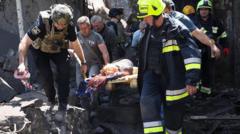Despite Russian claims of normalcy and reconstruction in Mariupol, residents reveal ongoing hardships, including water shortages, limited medical supplies, propaganda in schools, and dangerous daily life under occupation—highlighting a stark contrast to the image portrayed by state media.
"Life in Mariupol: A stark contrast to Russian propaganda"

"Life in Mariupol: A stark contrast to Russian propaganda"
Residents in occupied Mariupol paint a grim picture of life, challenging the rosy narratives presented by Russian authorities.
In the wake of Russia's occupation of Mariupol, a city devastated by war, residents are speaking out against the government's portrayal of a return to normalcy. John, a local who wished to remain anonymous due to safety concerns, condemned the "fairy tales for fools" being broadcasted by Russian state media. He described how facade repairs on main streets mask the extensive destruction, with many residents still inhabiting properties that stand on the brink of collapse.
The city fell to Russian forces over three years ago, during a terrifying siege that left thousands dead and devastated 90% of its housing, according to the UN. Recently, pro-Russian influencers have spread narratives of recovery, but testimonies gathered by the BBC from various residents starkly contradict these claims.
"The reality is that Mariupol is like a sick patient," remarked Olha Onyshko, a former resident who fled late last year. She lamented the state of her hometown, saying, "There’s only superficial restoration. Not much has really been fixed." Furthermore, she detailed disturbing reports of bodies being disposed of alongside rubble during cleanup efforts.
Water supply problems plague the city, with residents indicating that available water frequently lacks safety or cleanliness. One local, known as James, described the unsettling color of their tap water, comparing it to "coca cola." Serhii Orlov, acting as Mariupol's deputy mayor in exile, noted that the watershed that previously supplied the city was heavily damaged, leaving most residents without a reliable source of drinking water.
Beyond basic necessities, residents face shortages of medications, with diabetic patients struggling for access to insulin. Frequent power outages further complicate day-to-day life, while exorbitant food prices add to community burdens.
In terms of education, parents fear the impact of propaganda taught to their children in occupied schools. Andrii Kozhushyna, a former student at a Mariupol university, recounted alarming shifts in curriculum that push pro-Russian narratives and downplay Ukraine’s history. "This is an effort to brainwash our kids," he expressed.
As Russian flags dominate public spaces and Soviet-era events gain resurgence, a quiet resistance continues to brew among residents. Groups working clandestinely paint pro-Ukrainian messages and gather intelligence on Russian troop movements, often at great personal risk. James shared his experiences of documenting military logistics while constantly evading surveillance, risking his life for the hope of liberation.
The atmosphere in Mariupol is fraught with tension and distrust, with the fear of arrest palpable among the populace. "Every day, we live like we’re in a movie," James said, reflecting the psychological toll of living under constant scrutiny.
As talks of peace between Russia and Ukraine circulate, many in Mariupol are skeptical. "We don't want 'peace at any cost'," stated John. "Our life here isn't just a bargaining chip." Each day, the residents of Mariupol struggle not just for survival, but for their identity and future dignity amidst devastating conditions.




















